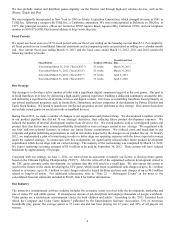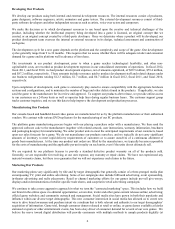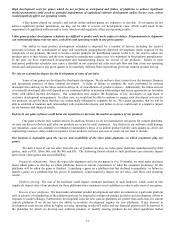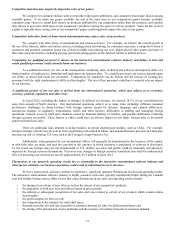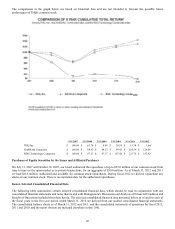THQ 2012 Annual Report Download - page 22
Download and view the complete annual report
Please find page 22 of the 2012 THQ annual report below. You can navigate through the pages in the report by either clicking on the pages listed below, or by using the keyword search tool below to find specific information within the annual report.14
We may face difficulty obtaining access to retail shelf space necessary to market and sell our products effectively.
Retailers typically have a limited amount of shelf space and promotional resources, and there is intense competition
among consumer interactive entertainment software products for high quality retail shelf space and promotional support from
retailers. To the extent the number of products and platforms increases, competition for shelf space may intensify and may
require us to increase our marketing expenditures. Retailers with limited shelf space typically devote the most and highest
quality shelf space to those products expected to be best sellers. We cannot be certain that our new products will consistently
achieve such "best seller" status. Due to increased competition for limited shelf space, retailers and distributors are in an
increasingly better position to negotiate favorable terms of sale, including price discounts, price protection, marketing and
display fees, and product return policies. Our products constitute a relatively small percentage of most retailers' sales volume.
We cannot be certain that retailers will continue to purchase our products or to provide those products with adequate levels of
shelf space and promotional support on acceptable terms which may significantly harm our business and financial results.
Increased sales of used video game products by retailers could reduce demand for new copies of our games.
Several retailers, including one of our largest customers, GameStop, continue to focus on selling used video games,
which provides higher margins for the retailers than sales of new games. This focus reduces demand for new copies of our
games. We believe customer retention through compelling online play and downloadable content offers may reduce
consumers' propensity to trade in games; however, retailers' continued sales of used games, rather than new games, may
adversely impact our ability to sell new games and could adversely impact our net sales, operating results, and cash flow in any
given quarter.
Software pricing and sales allowances may impact our net sales and profitability.
We establish sales allowances based on estimates of future price protection and returns with respect to current period
product net sales. While we believe that we can reliably estimate future returns and price protection, if product sell-through
does not perform in line with our current expectations, return rates and price protection could exceed our reserves, and our net
sales could be negatively impacted in future periods.
If we are unable to sustain premium pricing on current-generation titles, our operating results may suffer.
If we are unable to sustain premium pricing on current-generation titles for the Xbox 360, PS3 and the Wii for as long
as those platforms remain current generation, whether due to competitive pressure, retailers electing to price these products at a
lower price or otherwise, we may experience a negative effect on our margins and operating results. Additionally, software
prices for games sold for play on the PS3 and Xbox 360 are generally higher than prices for games for the Wii, handheld
platforms or PC games. As a result, our product mix in any given fiscal quarter or fiscal year may cause our net sales to
significantly fluctuate, depending on which platforms we release games on, in that quarter or year. Further, we make
provisions for in-channel price reductions based upon certain assumed lowest prices and if competitive pressures force us to
lower our prices below those levels, we may experience a negative effect on our margins and operating results.
Development of software by platform manufacturers may lead to reduced sales of our products.
The platform manufacturers, Microsoft, Nintendo and Sony, each develop software for their own hardware platforms.
As a result of their commanding positions in the industry, the platform manufacturers may have better bargaining positions with
respect to retail pricing, shelf space and retailer accommodations than do any of their licensees, including us. Additionally, the
platform manufacturers can bundle their software with their hardware, creating less demand for individual sales of our
products. Continued or increased dominance of software sales by the platform manufacturers may lead to reduced sales of our
products and thus lower net sales.
Increased development of software and online games by intellectual property owners and developers may lead to reduced net
sales.
Some of our games are based upon licensed intellectual properties. In recent years, licensors and independent
developers have increased their development of video games in digital and other online distribution channels, which could lead
to such licensors not renewing our licenses to publish games based upon their properties that we currently publish, or not
granting future licenses to us to develop games based on their other properties. If intellectual property owners continue
expanding internal efforts to develop video games based upon properties that they own rather than renewing our licenses or
granting us additional licenses, our net sales could be significantly impacted.


